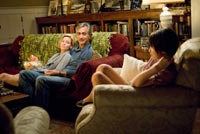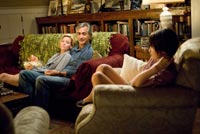American remakes of Asian thrillers have become so commonplace that they’re essentially a subgenre unto themselves. Films like The Ring and The Grudge—perhaps the highest profile movies in this subset—inspired a whole slew of imitators, not all of which are actually based on Asian source material, but, interestingly enough, that doesn’t really matter. So numerous are these movies, and, frankly, so similar are they to one another, that comparing the remakes to the originals isn’t nearly as helpful as comparing the remakes to other remakes, and to similar American imitations and knock-offs. Though the trend may have its roots in Asian suspense, it’s basically an American phenomenon at this point.

So while it might be mentioned that The Uninvited is a remake of an Asian movie, comparing it to the original only takes one so far. The basic premise has a certain elasticity to it, allowing it to be told in a variety of different ways, and in fact, it’s the kind of movie where the actual story isn’t nearly as important as how that story is told. Like a good joke, the fun is in the build-up, and if this isn’t done well, the punch-line doesn’t have nearly the same punch. And in the case of this film, the telling of the story is hampered by one simple thing—the fact that it devotes just a bit too much attention to replicating the very American tropes of its genre, and not enough attention to building the suspense and menace that it requires.
I say a bit too much attention because, as far as this kind of movie goes, The Uninvited is not at all a bad movie—it’s just not as good as it could be. The story is one of madness and psychological trickery, and, for it to be truly effective, it needs to be told in a way that is stylish but also a bit disorienting; in the hands of directors Charles and Thomas Guard, however, the movie is winsomely concise and professionally-made, but it also gets bogged down in just a few too many suspense movie clichés.

The story is punctuated with flashbacks and hallucinations, mirroring the confusion felt by its lead character, Anna (Emily Browning, Lemony Snicket). The film opens with her being discharged from a mental hospital, where she was recovering from the trauma of losing her ailing mother in a freak fire. Her father, Steve (David Strathairn, The Bourne Ultimatum), didn’t waste much time after the death of his wife before becoming involved with her former nurse, Rachel (Elizabeth Banks, W.). Now Anna and her sister Alex (Arielle Kebbel, The Grudge 2) must deal with their new soon-to-be-stepmom—who appears to be just barely older than either of them—and the stronghold she has on their father.
But naturally, family discord proves to be the least of their problems. A series of baffling, ominous dreams lead Anna to believe that the events of the fatal fire were not accidental, and that Rachel is not who she seems to be. She and Alex are quickly convinced that their family is in danger, and they set out to reveal the truth about Rachel and about the death of their mom.

The movie would work well as a psychological thriller, one that blurs the line between reality and Anna’s feverish hallucinations, and, when the Guard brothers choose to take it down this path, it’s a fine piece of work; too often, though, they settle for generic jump scenes, stale imagery, and, most annoyingly, an instrumental score that could be played over pretty much any other suspense film of the past ten years. The fact that the movie ends with a rather gimmicky, Sixth Sense-style twist doesn’t help matters.
For all of those faults, though, there are some genuinely creepy scenes here—many of which work largely on the strengths of the actors, in particular Browning, who captures Anna’s fragile emotional state without overacting. And while many of the surprises are, in fact, no surprises at all, the film does manage to catch the viewer off guard a time or two. Its greatest strength, though, is its brevity—at under 90 minutes, the movie marches toward its climax with ruthless efficiency, and the plot advances quickly, which means that, while you might not be scared by it, exactly, you won’t be bored by it, either.

It’s a harmlessly diverting work, which, for Christian moviegoers, might be a bit of a mixed blessing. On the one hand, there are much more masterful, effective suspense films than this one, but then again, there are also much darker, more evil ones than this one. The Uninvited, for all its faults, manages to be a fast-moving suspense film that never feels oppressively dark or sinister—it can actually be fun to watch, if not particularly memorable. And that makes it one of the genre’s better choices for the teens who make up its target audience—on a relative scale, of course. There are a few points that parents should consider (see The Family Corner below) before allowing teens to see it, but this is a rare thriller that’s more about suspense than menace, and that’s a development worth welcoming.
Talk About It
Discussion starters- Anna has some emotional and psychological problems, seemingly caused by grief. Does the film have anything meaningful to say about coping with grief and loss?
- Do you think Steve trusts Anna? Should he trust her?
- Are there any noble or virtuous characters in this film? If so, which ones?
The Family Corner
For parents to considerThe Uninvited is rated PG-13 for scary and suspenseful moments and some images of violence—not much violence is actually seen, but we see plenty of bloody aftermath. There is also some sexually suggestive dialogue and scenes of teens drinking heavily. There isn’t a lot of foul language, but what language there is tends to be strong, including some severe blasphemies and a use of the f-word. This is definitely not one for kids or young teens, though it should be noted that it’s much less dark and less violent than many other films of its kind.
Photos © Copyright DreamWorks
Copyright © 2009 Christianity Today. Click for reprint information.








